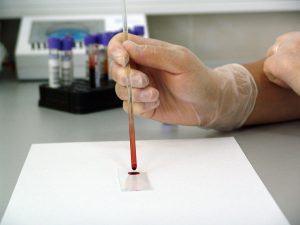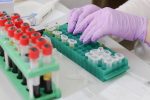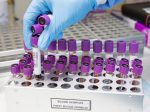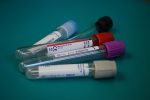
If becoming a phlebotomist is what you are interested in, this is the right moment to make your dreams come true as the demand for phlebotomists is high.
The need for these professionals is growing due to the fact that the medical industry grows each year.
The number of labs, hospitals, and pharmacies is increasing being that there is growing patient demand.
Choosing a phlebotomy career is a great decision as it will provide you with job security, a high annual salary, and advancement opportunities.
In the majority of states, you will not be required to complete an accredited program so as to start work as a phlebotomist, but you should think about gaining proper education as those individuals who have taken phlebotomy classes not only enjoyed better employment opportunities but a higher salary as well.
As we have already mentioned, you are not obliged to obtain certification in most states, but if you get it, you will definitely stand out from the competition.
You need to be very careful when choosing the training program, as it can affect the type of position you can qualify for.
Phlebotomy certification programs can be attended at community colleges, vocational schools, technical schools, and universities and most of them will provide you with a certificate of completion or a diploma.
In some states, there are associate’s degree programs available as well.
Page Navigation
What Is a Phlebotomist?
Phlebotomists are professionals who make incisions in veins and draw blood from a patient using a needle.
It can be said that any medical practitioner trained in drawing blood can be considered a phlebotomist, we need to emphasize the fact that there are specialized phlebotomists.
These qualified phlebotomists practice venipuncture.
What Is Venipuncture?
Venipuncture is a procedure during which a phlebotomist draws a small amount of blood from a patient which will be later on used for testing purposes.
This is taken as the main duty of the phlebotomist, and they perform this procedure many times each day
In case doctors order a blood test which is necessary so as to know how to treat a patient and potentially diagnose a condition, he/she will be in need of a phlebotomist.
No matter whether this situation happens at the doctor’s office or a special medical testing facility, a phlebotomist is the one who can carry out the venipuncture.
Besides drawing blood samples, the phlebotomist has to label the blood sample and properly transport it to a lab where it will be tested.
Furthermore, phlebotomists draw blood from a patient for purposes of blood donation, blood transfusions, or even for research.
In certain situations, a phlebotomist will only collect very small quantities of blood using fingersticks, but this is highly dependable on the tests.
Other Duties of a Phlebotomist
Besides the above-mentioned duties, phlebotomists perform other duties as well, such as preparing a patient, explaining procedures to patients, restoring hemostasis of puncture sites, delivering blood samples, and many more.
So as to perform this job well, a phlebotomist has to feel comfortable with blood drawing and have good people skills too, as he/she will have to deal with dozens of patients each day.
Have in mind that not every patient is comfortable with needles.
A phlebotomist’s duty is to help a patient understand why a test is necessary and make them feel as relaxed as they can be.
If you are ready for all these duties, you should keep on reading the article and find out how you can become a phlebotomist.
Why You Should Become a Phlebotomist
First and foremost, these people are constantly helping other people in need.
Phlebotomists do a lot of good on a regular basis, as they help doctors accurately diagnose diseases.
According to blood tests, patients can receive the medical care they need.
Phlebotomists are those who need to make sure that doctors and nurses spend less time trying to obtain blood samples.
When their salary is in question, on average, phlebotomists earn about $15 USD an hour.
This means that their annual salary is around $29,730 USD.
The job outlook is so great for this profession that in about ten years, it is expected to grow by about 27%.
This means that the demand has never been higher and the need for phlebotomists will be even greater.
So, if you want to become a phlebotomist, now is the best time to consider enrolling in a phlebotomist program.
Why Enroll in a Phlebotomy Course?
Even though it is not obligatory to possess a certification to become a phlebotomist in most US states, there are some of the states, like California, Washington, Nevada, and Louisiana that require special licensing so as to be able to get a job.
Besides the fact that is not necessary, our suggestion is that you should consider certification in other states, as well.
This is important as you will be among many people who might possess it, and when applying for the same job, they will be given an advantage.
Have in mind that the medical field is very competitive, and having certification and experience in the field will only bring you benefits.
If you earn a certificate in a state that does not require it, it will show future employers that you are serious about your career and you will be considered a more appropriate candidate.
Another advantage of taking a phlebotomy course that you will be ready to start a career in phlebotomy.
Furthermore, this can be a starting point for those who want to advance in the medical field, and who are interested in pursuing a degree and career as a doctor or a nurse.
By obtaining your certification to become a licensed phlebotomist, you will also improve your chances of getting a higher salary and better job position.
Qualifying for Enrollment
Two main requirements that you need to meet when qualifying for enrollment into a phlebotomy training program are to be at least eighteen years of age and possess a high school diploma or a GED.
There will also be a requirement in some schools that applicants possess up-to-date immunizations.
If you want to enroll in a school that has these requirements, make sure you schedule your vaccinations before you enroll in school.
Have in mind that there are programs that will require that you pass a criminal background check and drug screening.
So, prior to even applying for enrollment, you need to make sure that you have a clean criminal record, a diploma/GED, and all your vaccinations up-to-date.
You may be applying to multiple programs as there are hundreds of colleges and institutions that offer phlebotomy training.
Warning: Why Accreditation is Key in the Venipuncture Field
If you are wondering how long the phlebotomy program lasts, we have to tell you that it depends on whether you go full or part-time.
This is another important thing to think about before you consider enrollment in a phlebotomy program.
The length of the program will also be based on how much time each week you can devote to clinical work.
Our sincere advice, before enrolling, is to do research with the aim to determine if the school you are interested in offers a program that is accredited.
This is very significant, as a program that is not accredited, will not make you eligible to take the certification exam after graduation.
An accredited program has the course material which has been approved by a certifying agency and this is especially important if you plan to work in a state that requires certification.
We need to mention that some schools that advertise exclusively online programs for phlebotomy and those courses offered by for-profit institutions such as the University of Phoenix are usually not accredited.
To be sure that the program is accredited, you should consider taking a phlebotomy course at a public or community college.
Classes and Clinical Training for the Phlebotomist
Once you enroll in a training program, you will be attending in-class training and clinical work in a real medical setting.
The in-class portion will last six to twelve months.
Again there are certain colleges that offer phlebotomy courses that last only two semesters.
How long it will take to complete a phlebotomy program depends only on your school and your schedule.
If you think about how much you will have to pay for these programs, tuition varies from program to program/
On average, it is around $2,000, without required textbooks.
Financial aid and student loans are available with most programs.
When the curriculum of a phlebotomy program is in question, it includes subjects such as venipuncture procedures, medical ethics, patient interaction, specimen care, medical terminology, and human anatomy.
Not only will you be trained on how to perform your duties as a phlebotomist, but also how to interact in various medical settings.
The in-class portion also involves lab work which enables students to practice simulated venipuncture procedures.
Students work on mannequin arms and practice blood draw techniques.
Last, but not least, there is a clinical, practical training portion of these programs.
After you finish the classes, you will be prepared for the clinical portion of the program.
Clinical Training Classes
The clinical portion is done at a local hospital or clinic, where students first only observe professional phlebotomists when they interact with patients and co-workers.
Later on, they start performing venipunctures themselves, as the only way to qualify for certification is to complete a hundred unaided venipuncture procedures.
Most programs will also require students to perform a hundred unaided venipunctures to graduate.
During clinical training in a medical facility, the phlebotomy student works under the direct supervision of professional phlebotomists and facility staff.
This portion typically consists of forty hours of practical training and the main aim of this part is to make students will feel confident enough to complete venipunctures on their own.
What they will also learn during this portion is medical terminology, how to read physician’s orders, and how to interact successfully with patients.
Furthermore, the students will become knowledgeable about insurance forms, how to safely handle and dispose of samples and how to correctly store and transport them which is all necessary for a successful career as a phlebotomist.
Phlebotomy Certification & Exams
Once you enroll in these classes and complete the course, you will become prepared for the certification exam.
The certification exam consists of practical and written components and you can find it available by dozens of licensing organizations in the country.
The main aim of this exam is to test your knowledge of all aspects of phlebotomy.
You need to pay attention to the organization you choose for getting the license, being that California only recognizes licenses from six organizations.
The Phlebotomy Career: Life after Graduation
Upon graduation, you should not worry whether you will find employment, as numerous medical facilities, such as hospitals, clinics, private practices, and federal labs are in constant need of qualified phlebotomists.
You can also choose to work as a mobile phlebotomist at the beginning of your career, so as to gain experience.
This is an ideal possibility for individuals who enjoy traveling.
These companies that hire mobile phlebotomists are usually privately owned.
Also, hospices and home health agencies usually hire experienced and entry-level phlebotomists who will be in charge of providing care to a patient in their own home in case they cannot travel.
An excellent opportunity will be if you manage to find work in a larger medical facility, where you will be surrounded by some experienced phlebotomists.
You can always try reaching opportunities for career advancements and become lead phlebotomy tech, supervisor, or manager if you have aspirations and enough knowledge for these positions.








